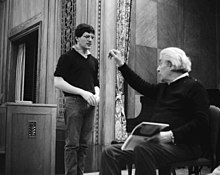Sergiu Celibidache

Sergiu Celibidache (Romanian: [ˈserd͡ʒju t͡ʃelibiˈdake]; 11 July [O.S. 28 June] 1912 – 14 August 1996) was a Romanian conductor. He was one of the great conductors of his time, living in Germany all his adult life.
His life[change | change source]
Celibidache was born in Romania. He went to Berlin in 1936 and in 1939 studied there at the Hochschule für Musik. He got a doctorate by writing about the Renaissance composer Josquin Desprez. He was lucky very early in his career to be appointed as conductor of the Berlin Philharmonic Orchestra. He stayed with them until 1952 when Wilhelm Furtwängler returned. He later worked with radio orchestras in Stockholm, Stuttgart and Paris. He also worked for a time in Britain, as well as touring in Europe and South America. From 1979 until his death he was music director of the Munich Philharmonic. He taught at Mainz University in Germany and in 1984 taught at the Curtis Institute in Philadelphia, Pennsylvania. He liked teaching and often let students come to his lessons without having to pay.
Celibidache did not like making recordings, although there are a few recordings of his concerts which have survived. He was well known for asking for lots of rehearsals, and he rehearsed his orchestras in great detail. He often chose very slow speeds for the slow movements and very fast speeds for the fast movements.
In Munich he had a long argument with the trombone player Abbie Conant because he did not want her in the orchestra. Conant thought it was because she was a woman that he did not want her. The argument lasted for 12 years.
Celibidache died near Paris in 1996 at 84.
References[change | change source]
New Groves Dictionary of Music and Musicians, ed. Stanley Sadie; ISBN 1-56159-174-2
